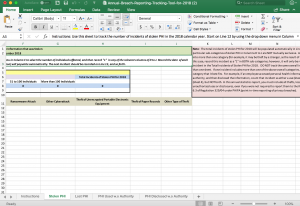Annual statistical reporting – clarification for 2021

It’s that time of year again … annual statistical reporting to the Information and Privacy Commissioner of Ontario.
There has been some confusion this year. Let’s break down the rules …
[Prefer to watch a video: I clarify on video here]
Question 1: Do we have to complete an annual statistical report?
There was some confusion this year as the IPC’s website originally stated that all health information custodians had to report the number of access requests from 2020. But the IPC’s website has since been updated.
So the short answer is, you have to complete an annual statistical report in 2 situations:
- If you are a special type of health information custodian who is also subject to FIPPA or MFIPPA (like a hospital, public health unit, municipal home etc.) you have to report the number of access requests and privacy breaches from 2020. You have to report even if you had zero requests or breaches. This will not be news to you. Carry on doing what you’ve been doing for years. (Need some help? Here are the IPC’s special reporting guidelines for organizations that are subject to PHIPA/FIPPA/MFIPPA)
- If you are a regular every day run of the mill health information custodian (like medical clinics, family health teams, nurse practitioner led clinics, birth centres, regulated health professional practices, long term care homes, home care services, community health centres, mental health facilities etc.) and you had certain types of privacy breaches in 2020.
If you are a regular HIC and you did not have any privacy breaches in 2020 – no need to file an annual statistical report. You can stop reading now.
Question 2: What kinds of privacy breaches have to be reported?
Not all privacy breaches have to be reported in an annual statistical report. You ONLY report privacy breaches in the following categories:
- Number of incidents where personal health information was stolen
-
- by an internal party
- by a stranger
- by a ransomware attack or other cyber attack
- on an unencrypted portable electronic device
- in paper format
- Number of incidents where personal health information was lost
- due to ransomware attack or other cyber attack
- on an unencrypted portable electronic device
- in paper format
- Number of incidents where personal health information was used without authority
- through electronic systems
- though paper records
- Number of incidents where personal health information was disclosed without authority
- through misdirected faxes
- through misdirected emails
There are additional details required to capture the number of individuals affected in each category. Check the guidelines for the categories. Also, the IPC’s online reporting form itself will guide you.
NOTE: Privacy breaches should be counted once even if they would otherwise fit multiple categories.
Question 3: What’s the deadline for filing the report?
For some reason, this year the IPC has given health information custodians until March 31 to file your annual statistical report. BUT, I would highly recommend you get it in before February 28 (as technically that is what s. 6.4 of the Regulation requires).
Question 4: In group practices, who has to report?
This is the million dollar question. If you are in a group practice, like a Family Health Team or a Family Health Organization or a Nurse Practitioner Led Clinic or a Birth Centre or a multidisciplinary team or partnership – you have to know whether there is a single health information custodian or whether each clinician is individually a custodian. How do you know? It should be written down. If it is not written down – you should get legal advice to determine who is the custodian or custodians.
Every health information custodian is required to track and report privacy breaches. In group practices where individual clinicians are individual health information custodians, each HIC reports but only if that HIC had a privacy breach in one of the above categories. So for some group practices where there are multiple custodians, only a few clinicians will have to complete the report not everyone. Need some help? Call me. It’s possible that a group practice identifies a single Privacy Officer who does the reporting for multiple HICs.
Ready to report? Here’s the link to do your online annual statistical report
Here’s the link to the IPC’s explanation of who has to file an annual statistical report.
Here’s the link to the IPC’s FAQ website on health privacy breach annual statistical reporting.
Here’s a link to the Ontario Hospital Association’s free sample excel spreadsheet to keep track of your privacy breaches. Annual Breach Reporting Tracking Tool
 .
.
Free Ask Me Anything Webinars for health Privacy Officers for 2021: register here
Free summary of all the IPC decisions in Ontario: click here
Ready to be trained as a Privacy Officer? Our Health Privacy Officer Foundations course starts again April 2021!